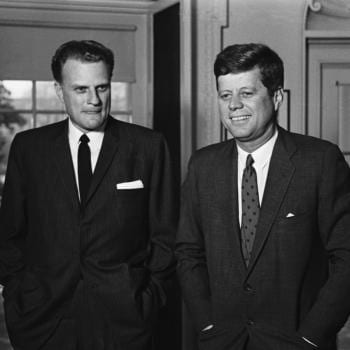I have been reading a surprising number of recent posts that raise questions about whether Christians should be as approving of popular culture as we are. Since I grew up in a fundamentalist home, I have having a case of deja vu.
For instance, John Piper advises on advice-seeker to trust his instincts and worry about watching movies and television:
One of the things that I want to say is that I know there are people who would counsel Craig by simply saying, “Lighten up. Good grief, you sound like a legalist. Just go ahead. Relax and enjoy the entertainments that feel like they are a threat to your holiness. You are perfect in Jesus, you know, because you have your justification. It doesn’t matter what movies you watch or how much time you spend with TV or video games or Facebook or Twitter. It doesn’t matter. Just lighten up and enjoy your freedom in Jesus.”
The problem with that counsel is that it totally contradicts the relationship between justification and sanctification. When Jesus and Paul and the writer of Hebrews and the other New Testament writers describe the glorious truth that we are accepted by God — that is, justified by God or loved by God by grace alone, on the basis of Christ alone, through faith alone — that reality unleashes a power for holiness which we in fact experience through major spiritual warfare against the world, the flesh, and the devil.
Peter Leithart also wrote recently about the dangers of letting popular culture shape a Christian’s outlook and expectations:
This is where the church comes in. If the battle we face in the wider culture were merely a matter of ideas and thoughts, then we might be able to withstand the onslaught of bad ideas on our own. We might be able to fill our minds with good thoughts and ideas through reading and studying, and when a bad idea came up, we’d pounce.
If we are cultural beings, whose habits and practices and desires are shaped by the habits and practices and desires of others around us – and we are – then we can’t really stand up to the cultural temptations in isolation, by ourselves. We cannot resist on our own. We need to be part of a resistant community, a resistant community that recognizes the way the world seeks to shape us into its image, and self-consciously resists the world.
Joe Kim added to the wariness about Hollywood and its products by tying the perils of movies to Harvey Weinstein:
Culture making, in and of itself is not inherently a good thing. Its producers are just as prone to sin as the rest of us, and perhaps are even more so. Part of the problem is that culture makers are constantly pushing the boundaries of culture, usually by challenging norms. While it may be true that the best of these edgy cultural mavens help society adapt to new challenges in our ever changing world, it is also true that these moguls and auteurs open themselves up to the very things those cultural norms were designed to protect us from.
Unless you’ve been living under a rock for the past month or so, Hollywood mogul Harvey Weinstein has been in the news a lot. Harvey Weinstein is a culture maker.
Even a cursory glance at the list of movies that he produced will give you a glimpse into how much influence he has, not just in Hollywood, but in Western secular culture.
But Harvey’s work, regardless of how culture-shaping it was, has been shown to be a pretext for predation. The movie industry auteur has been accused of sexual harassment and at least one allegation of rape. Weinstein isn’t a gardener who cultivates. He is a predator who devours.
The implication is that Christians may want to avoid movies on which Weinstein has his fingerprints.
But I wonder. One of the reliefs of going from fundamentalism to Reformed Protestantism was that all cultural activities could be done for the glory of God. Even eating meat offered to idols:
4 Therefore, as to the eating of food offered to idols, we know that “an idol has no real existence,” and that “there is no God but one.” 5 For although there may be so-called gods in heaven or on earth—as indeed there are many “gods” and many “lords”— 6 yet for us there is one God, the Father, from whom are all things and for whom we exist, and one Lord, Jesus Christ, through whom are all things and through whom we exist.
7 However, not all possess this knowledge. But some, through former association with idols, eat food as really offered to an idol, and their conscience, being weak, is defiled. 8 Food will not commend us to God. We are no worse off if we do not eat, and no better off if we do. (1 Cor 8)
The apostle Paul’s calculations on an apparently dicey matter of food involved in outright sin — the worship of false gods — is markedly different from these recent arguments about culture.
And so I wonder. What’s going on?












